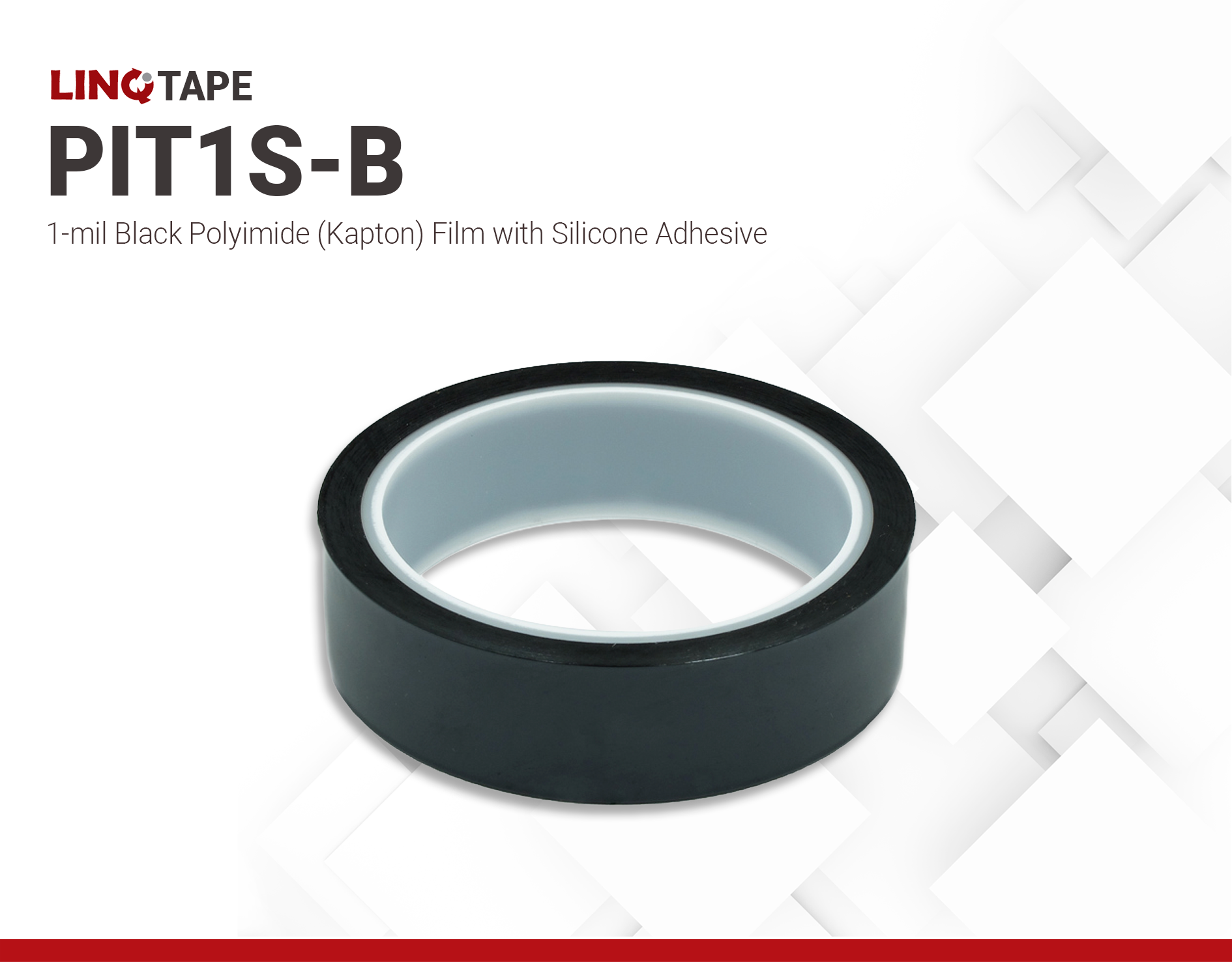PIT1S-B | 1-mil Black Polyimide (Kapton) tape with Silicone Adhesive
- 1 mil polyimide Film
- Opaque black color through the film
- 3000V Breakdown Voltage
Product Description
LINQTAPE PIT1S-B is a Kapton HN Alternative whose high performance, flexible, high-temperature resistant polyimide film is used for many high-temperature applications. Polyimide is preferred over polyester for many high-temperature applications. These applications include but are not limited to semiconductor, smartcard, electronic, automotive, and general manufacturing industries.
LINQTAPE PIT1S-B Tape provides an excellent balance of electrical, mechanical, thermal, and chemical properties over a wide range of temperatures. Tapes are typically only limited by their adhesive. This Silicone tape can be used in applications up to 260°C. This PIT1S-B(lack) film has an opaque black coloring, which results in almost no light transmission, higher heat resistance and higher resistivity than the standard PIT1S.
Technical Specifications
| General Properties | |
| Adhesive Layer Adhesive Layer A layer that is applied to one surface or both to bind items together and resist their separation | Silicone |
| Color Color The color | Black |
| Film Thickness Film Thickness Film thickness is the thickness of a backing film without taking into account any coatings or adhesive layers. It is measured in micron and the conversion factor to mil is 0.039. | 25.4 µm |
| Thermal Properties | |
| Temperature Resistance Temperature Resistance Temperature resistance is the maximum temperature that the material or product can withstand for a period of time. The temperatures listed should be considered as guidelines for an operating temperature of about 30 minutes. Typically, the material can withstand much longer times at temperatures about 20°C lower and can withstand much higher temperatures for short, intermittent times. | 260 ˚C |
| Electrical Properties | |
| Breakdown Voltage Breakdown Voltage Breakdown voltage is the minimum voltage necessary to force an insulator to conduct some amount of electricity. It is the point at which a material ceases to be an insulator and becomes a resistor that conducts electricity at some proportion of the total current. After dielectric breakdown, the material may or may not behave as an insulator any more because of the molecular structure alteration. The current flow tend to create a localised puncture that totally alters the dielectric properties of the material. This electrical property is thickness dependent and is the maximum amount of voltage that a dielectric material can withstand before breaking down. The breakdown voltage is calculated by multiplying the dielectric strength of the material times the thickness of the film. | 3000 V |
| Other Properties | |
| RoHS Compliant RoHS Compliant RoHS is a product level compliance based on a European Union Directive which restricts the Use of certain Hazardous Substances in Electrical and Electronic Equipment (RoHS). Products compliant with this directive do not exceed the allowable amounts of the following restricted materials: lead, mercury, cadmium, hexavalent chromium, polybrominated biphenyls (PBB) and polybrominated diphenyl ethers (PBDE), with some limited exemptions | Yes |
| Mechanical Properties | |
| Adhesion Strength Adhesion Strength Adhesion is the bond strength measurement of a coating to a substrate. When an adhesive is bonded to an item or surface, numerous physical, mechanical and chemical forces come into play, which may have an effect on each other. | 25 Oz/in |
| Elongation Elongation Elongation is the process of lengthening something. It is a percentage that measures the initial, unstressed, length compared to the length of the material right before it breaks. It is commonly referred to as Ultimate Elongation or Tensile Elongation at break. | 55 % |
| Tensile Strength (Thin Film) Tensile Strength (Thin Film) Tensile strength determines the resistance of a material to break under tension and it measures how much elongating load (or tensile stress) it can handle before fracture. To make it simple, it measures how much force we have to apply when pulling apart a material before it breaks. | 338 N/cm |



